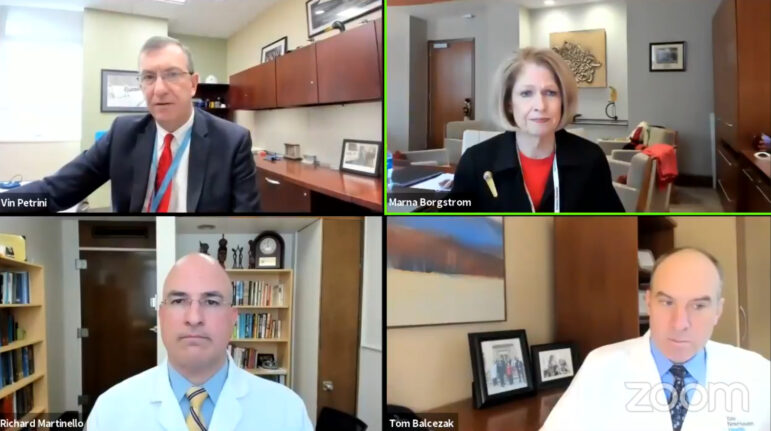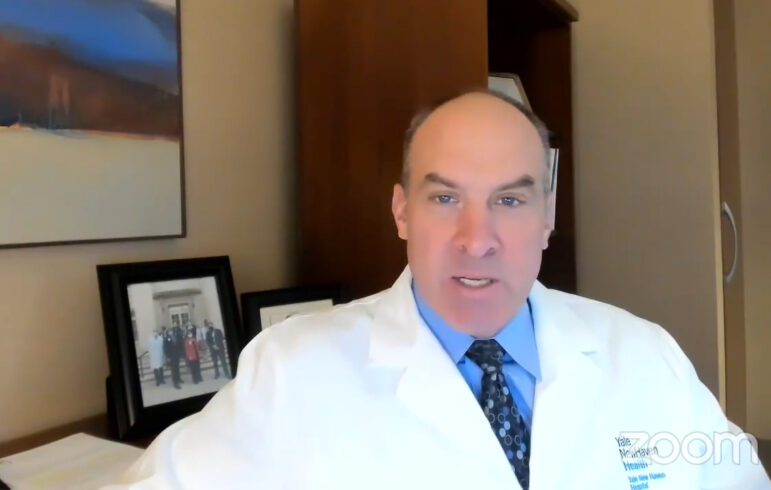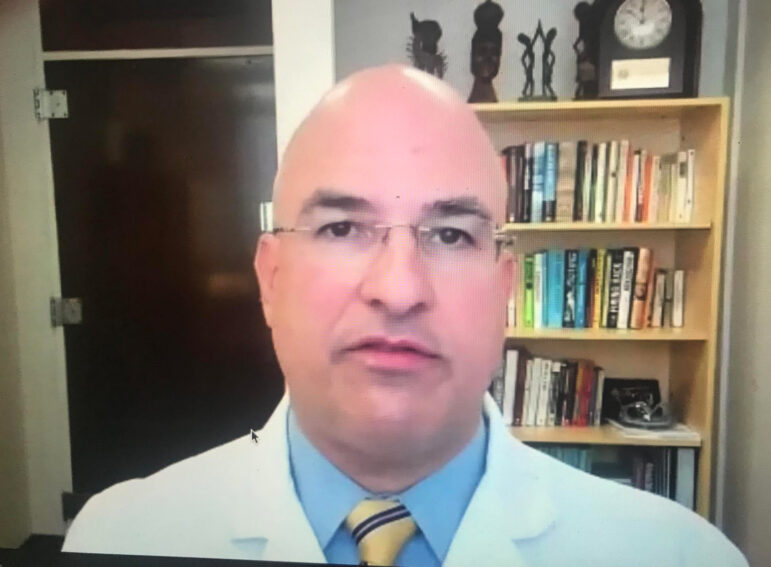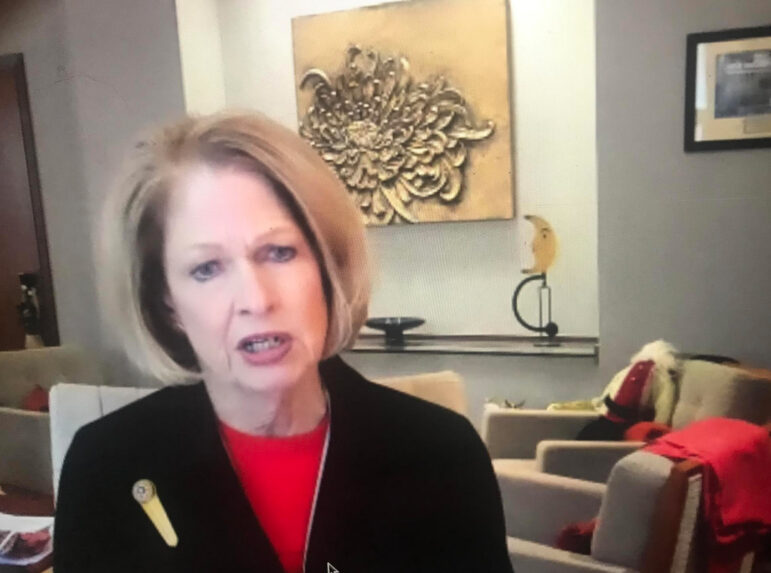In a Zoom press conference on Monday, Yale New Haven Health System CEO Marna Borgstrom shared troubling numbers.
She said on Monday there were 455 inpatients across the multi-hospital System, up 47 from a week earlier.
“The numbers are growing substantially,” she said, adding that as of Monday, the number of inpatients in their hospitals were:
• 41 at Greenwich Hospital (up from 27 a week earlier)
• 239 at Yale New Haven Hospital
• 132 at Bridgeport Hospital
• 32 at Lawrence & Memorial Hospital in New London
• 13 at Westerly Hospital in Rhode Island

Capacity
Borgstrom said hospital staff she’d spoken to were tired.
“They’ve been doing this since last March – when people were hunkered down last spring, terrified of this virus, not going anywhere, schools were closed, businesses were closed – these were the people who got up every day, and every night if they were on the night shift, to take care of Covid patients.”
Borgstrom said this wave of Covid is different. She said while there is adequate PPE this time, there was stress on the system.
“We need relief,” she said. “We need either more staff or fewer patients to be coming in.”
Borgstrom said while during the first wave of Covid, the System shut down electives, they didn’t want to discourage people from getting care.
She also said the Governor’s office offered additional capacity by setting up a field location.
Borgstrom said the System was also redeploying staff, particularly nurses with bedside experience, who had gone on to management roles.
Vaccines
Dr. Tom Balcezak said the FDA planned to meet on Dec 10 to consider the Pfizer vaccine, followed soon after by Moderna’s vaccine, and he expected they would approve the vaccines shortly.
Pfizer and Moderna’s vaccines both require ultra cold storage. A third vaccine, one from Oxford/Astra Zeneca, is also expected to be approved soon, but is based on a a different technology, and is stable at regular refrigerated temperatures.
Vaccination of Healthcare Workers
Dr. Balcezak said the System anticipated mass vaccination of about 29,000 staff who come into contact with patients (times two, because the vaccination requires two doses) over the next three or four weeks.
At this point in time, he anticipated the vaccinations would not be mandatory.
“If you work within our health System and you are healthy, and you are not old, and don’t work with patients, you’re going to be waiting probably until the spring before you are given access to the vaccine,” Balcezak said.
Balezak said pushing too hard and mandating the vaccine right now had potential for a backlash and resistance, rather than making it voluntary.
“Then at some point when we can establish the long term safety and efficacy of the vaccine, we would more than likely mandate the vaccine,” he added.


Also on the call was Dr. Richard Martinello, Medical Director, Infection Prevention, at Yale New Haven Health System, who asked what restrictions on daily activity he recommended.
He said while masks and physical distancing increase the safety of an activity, with restaurants and bars, it was impossible to remain masked.
He said a recent paper published in Korea found credible transmission of the virus in a restaurant setting about 25 ft from one table all the way to the other side of the room.
“What they showed in that paper was that the air flow went from the contagious person, directly all the way to the other side of the room. And even though it was beyond six feet, they made a pretty compelling case that these other individuals got sick from that contagious person on the other side of the restaurant.”
Dr. Richard Martinello, Medical Director, Infection Prevention, Yale New Haven Health System.
Still, Martinello said, while people need to go to the grocery store, and want to support restaurants, “There is a great deal of chance we take with our health and that of our family when we go to indoor locations like restaurants.”
Skepticism about the Pandemic, Distrust of the Vaccine, and Conspiracy Theories
Dr. Balcezak and Dr. Martinello talked about potential skepticism about the safety of vaccines, disbelief that the pandemic existed, and conspiracy theories.
“This is real. This is causing significant morbidity and mortality, and it is stressing our health care system across the US.”
– Dr. Tom Balcezak, Yale New Haven Health chief clinical officer.
Balcezak said he believed the virus had disproportionately impacted elderly people living in congregated environments, and people of color in densely populated or urban areas.
“Those are people who are marginalized and left out of mainstream discussion,” he said, adding that since visitors are restricted, especially in hospitals in hot spots, there is a degree of invisibility of the virus to the general public.
Still he said he anticipated that over time there would be increased acceptance of the vaccine as safe and effective.
“We have to accept that this is the only way to get out of this trouble we are in in this pandemic,” he warned.
Dr. Martinello said he believed people tend to look for simple answers, and those tend to be amplified on social media – even when they are incorrect.
“The ability for messages, some of which aren’t based in fact or reality, is to become amplified,” he said. “We desire to understand them in simple terms. Some are conspiracy theories. They are simple and spread more readily than facts.”
“Like a cancer, (conspiracy theories) degrade our understanding of reality, and it gets very confusing for people in terms of what to believe and how to make decisions based on facts,” Martinello said.
Immunity and Antibodies
Dr. Martinello said in the US, only about 10-15% of the population have antibodies, but that one recent paper indicated that the number of people with antibodies was decreasing.
“Some of the antibodies people are developing after they get infected are starting to go away,” Martinello said. “The concern about that is if you get infection, we don’t know at this point how long you may have a degree of immunity against Covid.”
“What we do know, and what’s been very well studied, are these vaccines,” he added. “We do know that the vaccines produce high levels of antibody and high degree of immunity.”
He said research to date indicates that receiving a vaccine will produce higher levels of antibodies compared with infections of the SARS-CoV-2 virus itself.
“Especially mild infections, which sometimes have been reported to produce somewhat lower levels of antibodies,” he added.
He said even for people who have been infected, he anticipated it would be strongly recommended they be vaccinated.

See also:
Lamont Shares Vaccine Timeline for CT; Camillo Reports Another Jump in Greenwich’s Covid-19 Numbers
Dec 5, 2020